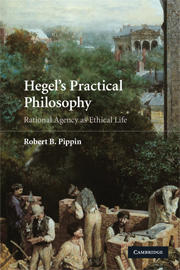7 - Hegelian sociality: recognitive status
Published online by Cambridge University Press: 05 June 2012
Summary
The claim I propose to defend in this chapter is that Hegel's “theory of recognition” is intended as an answer to a specific question in his systematic philosophy. That question is the question of the nature and the very possibility of freedom.
This will be controversial for several reasons. For one thing, it has come to seem natural to treat recognitive attitudes of various kinds as desirable or good because of some overall (perhaps even scientifically supported) concept of psychic health, and to understand the failure to achieve such psychological flourishing as a social harm with some claim on our political institutions. If we think of recognition as Axel Honneth portrays it (in ways clearly inspired by Hegel), as relations of love, respect, and esteem, then we are on the way to treating misrecognition, the absence of such social goods, as a social harm, one that ought to be corrected in some way. Treating Hegel's theory as about a key element in the realization of human freedom would be in line with this approach only if being-loved, being-respected and being-esteemed were necessary constituents of a free life, and I don't think that that is so, or that Hegel thought it was so. The issue for him is not in any conventional sense a psychological one, even primarily a matter of psychological harm.
- Type
- Chapter
- Information
- Hegel's Practical PhilosophyRational Agency as Ethical Life, pp. 183 - 209Publisher: Cambridge University PressPrint publication year: 2008
- 1
- Cited by

